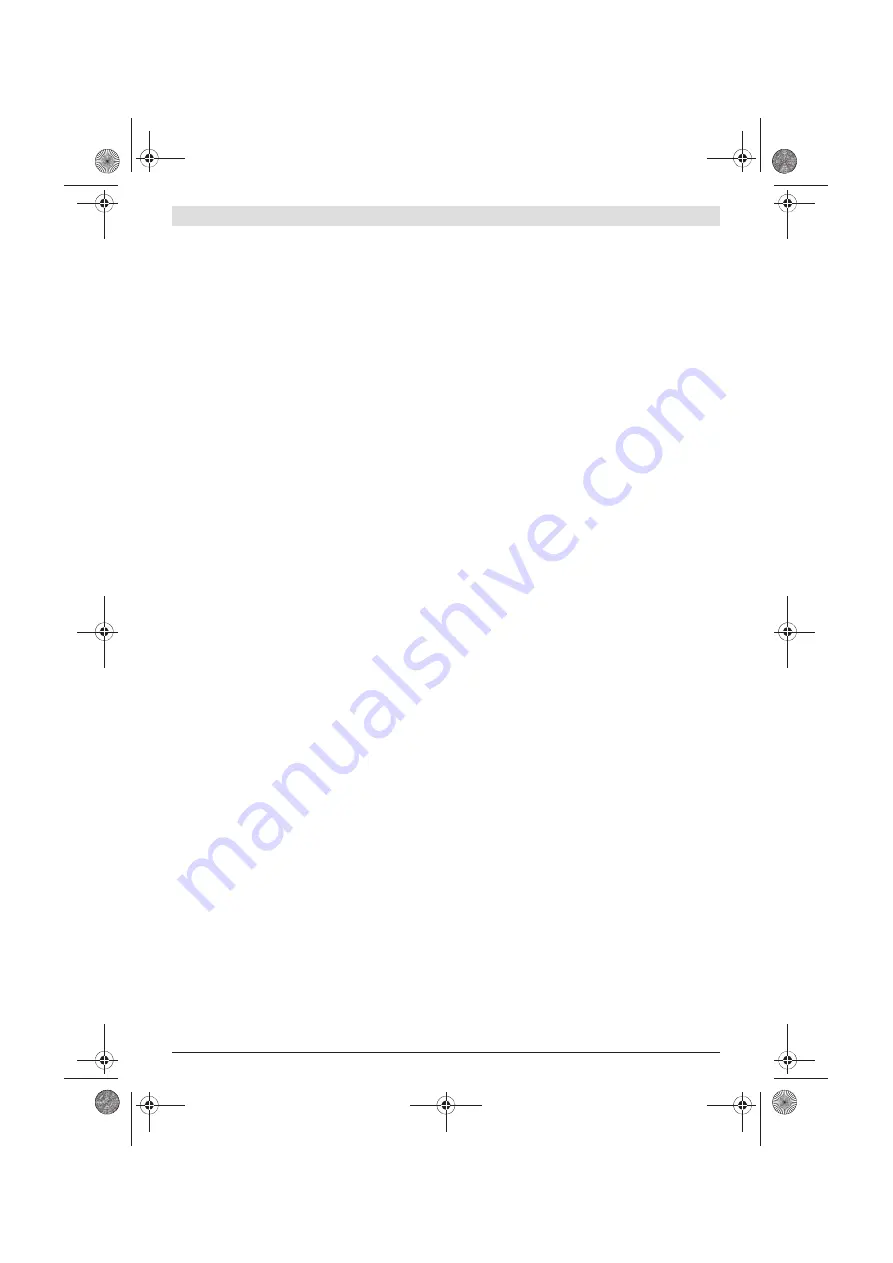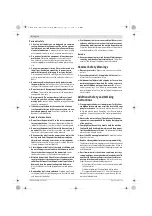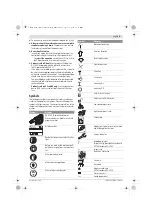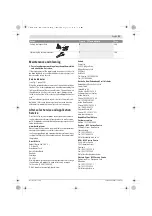
8
| English
1 609 92A 2BM | (22.8.16)
Bosch Power Tools
Personal safety
f
Stay alert, watch what you are doing and use common
sense when operating a power tool. Do not use a power
tool while you are tired or under the influence of drugs,
alcohol or medication.
A moment of inattention while op-
erating power tools may result in serious personal injury.
f
Use personal protective equipment. Always wear eye
protection.
Protective equipment such as dust mask,
non-skid safety shoes, hard hat, or hearing protection
used for appropriate conditions will reduce personal inju-
ries.
f
Prevent unintentional starting. Ensure the switch is in
the off-position before connecting to power source
and/or battery pack, picking up or carrying the tool.
Carrying power tools with your finger on the switch or en-
ergising power tools that have the switch on invites acci-
dents.
f
Remove any adjusting key or wrench before turning
the power tool on.
A wrench or a key left attached to a ro-
tating part of the power tool may result in personal injury.
f
Do not overreach. Keep proper footing and balance at
all times.
This enables better control of the power tool in
unexpected situations.
f
Dress properly. Do not wear loose clothing or jewel-
lery. Keep your hair, clothing and gloves away from
moving parts.
Loose clothes, jewellery or long hair can be
caught in moving parts.
f
If devices are provided for the connection of dust ex-
traction and collection facilities, ensure these are con-
nected and properly used.
Use of dust collection can re-
duce dust-related hazards.
Power tool use and care
f
Do not force the power tool. Use the correct power tool
for your application.
The correct power tool will do the
job better and safer at the rate for which it was designed.
f
Do not use the power tool if the switch does not turn it
on and off.
Any power tool that cannot be controlled with
the switch is dangerous and must be repaired.
f
Disconnect the plug from the power source and/or the
battery pack from the power tool before making any
adjustments, changing accessories, or storing power
tools.
Such preventive safety measures reduce the risk of
starting the power tool accidentally.
f
Store idle power tools out of the reach of children and
do not allow persons unfamiliar with the power tool or
these instructions to operate the power tool.
Power
tools are dangerous in the hands of untrained users.
f
Maintain power tools. Check for misalignment or bind-
ing of moving parts, breakage of parts and any other
condition that may affect the power tool’s operation. If
damaged, have the power tool repaired before use.
Many accidents are caused by poorly maintained power
tools.
f
Keep cutting tools sharp and clean.
Properly maintained
cutting tools with sharp cutting edges are less likely to bind
and are easier to control.
f
Use the power tool, accessories and tool bits etc. in ac-
cordance with these instructions, taking into account
the working conditions and the work to be performed.
Use of the power tool for operations different from those
intended could result in a hazardous situation.
Service
f
Have your power tool serviced by a qualified repair per-
son using only identical replacement parts.
This will en-
sure that the safety of the power tool is maintained.
Hammer Safety Warnings
f
Wear ear protectors.
Exposure to noise can cause hear-
ing loss.
f
Use auxiliary handle(s), if supplied with the tool.
Loss
of control can cause personal injury.
f
Hold power tool by insulated gripping surfaces, when
performing an operation where the cutting accessory
may contact hidden wiring or its own cord.
Cutting ac-
cessory contacting a “live” wire may make exposed metal
parts of the power tool “live” and could give the operator an
electric shock.
Additional Safety and Working
Instructions
f
Use appropriate detectors to determine if utility lines
are hidden in the work area or call the local utility com-
pany for assistance.
Contact with electric lines can lead
to fire and electric shock. Damaging a gas line can lead to
explosion. Penetrating a water line causes property dam-
age.
f
Observe the mains voltage! The voltage of the power
source must correspond with the data on the type plate
of the machine.
f
Firmly tighten the auxiliary handle, hold the machine
firmly with both hands while working and keep proper
footing and balance at all times.
The power tool is guided
more secure with both hands.
f
Insert the SDS-max application tool:
Check the latching
by pulling the tool.
f
Replace a damaged dust protection cap immediately.
The dust protection cap largely prevents the penetration of
drilling dust into the tool holder during operation. When in-
serting the tool, pay attention that the dust protection cap
is not damaged.
f
Dust from materials such as lead-containing coatings,
some wood types, minerals and metal can be harmful to
one’s health and cause allergic reactions, lead to res-
piratory infections and/or cancer.
Materials containing
asbestos may only be worked by specialists.
#
As far as possible, use a dust extraction system suitable
for the material.
#
Provide for good ventilation of the working place.
#
It is recommended to wear a P2 filter-class respirator.
Observe the relevant regulations in your country for the
materials to be worked.
!
"























